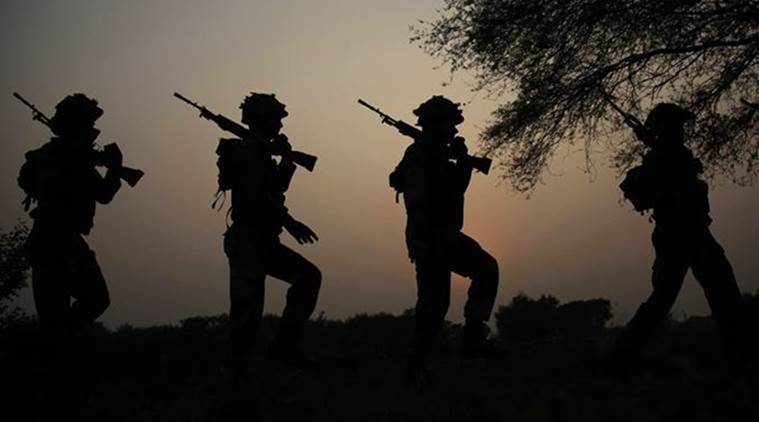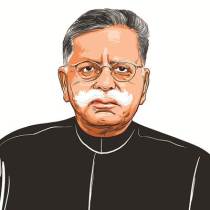A new confidence for the soldier
Surgical strikes showed NDA government’s unflinching support to the forces.

In the aftermath of the attack on the army camp in Uri, people’s anger was simmering against the audacity of the terror exporters.
The phrases, “surgical strikes” and”hot pursuit” have become part of popular discourse in India since the time the Indian military carried out the counter-terror operation on the other side of the Line of Control. In the aftermath of the attack on the army camp in Uri, people’s anger was simmering against the audacity of the terror exporters. It wasn’t the first time that they had launched such an attack. On 26 November, 2008, Mumbai, and indeed the nation, was shaken by one of the biggest terror operations on the country’ soil. However, the approach of the then UPA government in dealing with the perpetrators of the act was in marked difference to that taken by the current NDA government.
After 26/11, dossier after dossier was sent to Pakistan, which responded with denial and evasion. Post the Uri attack, however, the NDA government’s response was different. It did not send dossiers but allowed its army to cross the LoC and take down the camps that were funding and facilitating terror against India. The foresight shown by the government in backing the army in conducting a carefully-calculated retribution is nothing less than commendable.
The counter-terror operation was not an ill-thought out exercise. It was a calibrated move, keeping in consideration the capabilities of the Indian forces. On the night of September 29, 2016, Indian commandos crossed the LoC covering a distance of 3 km to launch a pre-emptive strike on a terror camp preparing the mujahideen for infiltration in Jammu and Kashmir and other parts of the country to conduct terror operations. Forty-five terrorists, including their guides and handlers, and nine Pakistani army men were gunned down. No casualties were reported on the Indian side.
The next day, India declared to the world that it had conducted such a strike. It sent out a clear message that India will no longer sit and tolerate terror on its soil. The country is capable of answering the enemy in its own language and will not succumb to international pressure of any kind. The entire episode displayed a paradigm shift in the way the country counters terrorism. For the first time, a fine balance was struck between political leadership, military capabilities and strategic competence of the two establishments. A well-plotted strategy executed to the tee, without any casualties, took down enemy camps and brought enough evidence to show those in denial (read Pakistan).
It was also the first time that India backed the army through and through and articulated its stand firmly to the world. In earlier instances, we would hold ourselves back owing to the ramifications any such act would have internationally. However, after the surgical strikes, when the government unequivocally supported the army action, many countries endorsed India’s move.
The pro-activeness in taking down infiltrators on their home-ground had a huge impact on demoralising the forces planning India’s destruction. A new red line vis-à-vis terrorism has been drawn by India. Anyone crossing it would have to pay a heavy price. The result of such a firm political stand on terrorism is reflected in the actions of the army. With the government at the Centre championing the “Nation First” approach, it has much more confidence and freedom to do what it does best. In the past four years, the number of civilian casualties due to terror attacks, outside of a conflict zone, has been zero. Dreaded terror groups like the Islamic State and al Qaeda have failed in their persistent attempts to target India and the country’s interests, under the Narendra Modi government. Compare this with an earlier era, when news of terrorist attacks had become the normal.
Surely, launching surgical strikes is not a one-off measure. A number of steps have been taken to structurally enhance India’s defence capabilities and preparedness. The Defence Procurement Policy brought out in 2016 provides for a vision to turn India from an arms importer to an exporter. A huge emphasis has been laid on new initiatives such as Make in India which call for greater indigenisation and relaxed FDI norms in the defence sector to encourage investment in defence production.
The government has also entered into a number of agreements with different countries for the modernisation of defence equipment and weapons. This includes the $8.7 billion deal for 36 Rafale aircrafts, a $2 billion deal for advanced surface-to-air missile systems from Israel as well as a $100-million contract with an Indian firm for supplying 1.86 lakh bulletproof jackets to the army.
The government has also shown its sincerity with its commitment to the welfare of soldiers and ex-service men who dedicated their lives to the service of the nation. The nation is forever indebted to its soldier. The same sentiment can be seen in the unflinching support of the government to the Indian forces. The soldier standing at the borders, is buoyed by the free mandate given to him. He is energised and emboldened as he takes on the threats to the soil on the battlefield.
The writer is a decorated soldier and a defence analyst.







































No hay comentarios:
Publicar un comentario